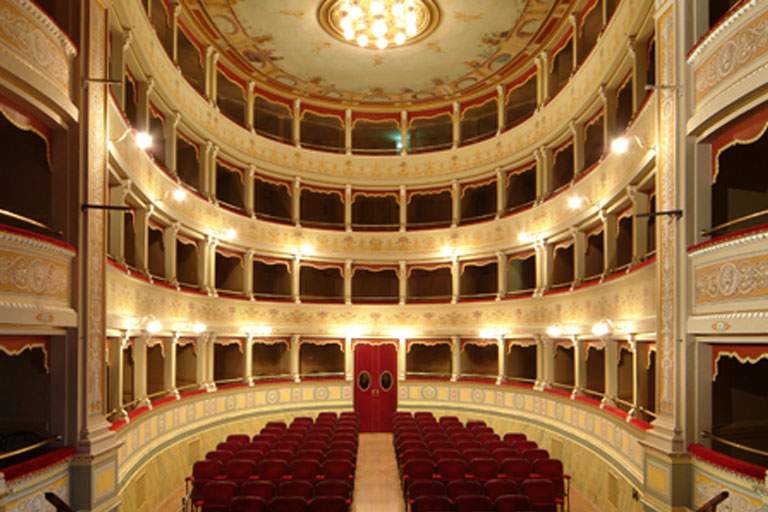Ministry of Culture acquires Amelia's Social Theater
The Ministry of Culture has acquired Amelia’s Teatro Sociale, the splendid 18th-century theater that had gone up for sale last year, and which had been awarded at auction last November: it had been won, for the sum of 414,000 euros, by a real estate investment company, but the sale was nevertheless subject to the possibility of the MiC exercising its right of first refusal, according to the provisions of Articles 60-62 of the Cultural Heritage Code for alienated property. The theater is listed as being of cultural interest.
And in the end, the ministry decided to exercise its right of first refusal and acquire the property, as confirmed by the entity: “The Ministry of Culture,” said Minister Dario Franceschini, “has exercised its right of first refusal on the Social Theater of Amelia, acquiring a historic property built in 1783 on commission of the local Philodramatic Society. This is an important step to ensure the continuity of a cultural space that is deeply felt by the community.” The building owes its name to the fact that a group of nobles and bourgeois from Amelia, a town in the province of Terni, wanted it at the end of the 18th century: the architectural design was entrusted to architect Stefano Cansacchi, while the frescoes are the work of the 1880s by Domenico Bruschi.
“The theater,” reads the ministry report, “not only represents a fine example of late 18th-century culture in Umbria as well as one of the last historical theaters in the Amerino-Narnese territory, of which Amelia is the capital, but it is still a place of cultural exchanges that see the city at the center of classical and modern music, dance and prose, opera and jazz events, all interpreted by guests of excellence. Deeply linked to the local artistic tradition, it has welcomed outstanding composers and performers in the fields of opera, concert, prose and the most varied intellectual forms, always constituting the natural venue and hub of the city’s many cultural activities.”
The theater’s cultural value is also due to its elegant 18th-century structure, the report goes on to say, and for this reason, moreover, it has been chosen several times as a film set. “In fact, one cannot fail to mention films,” the report points out, "that, starting in the immediate postwar period, have fixed the images of Amelia’s Teatro Sociale in celebrated films such as Pinocchio by Luigi Comencini or Il Marchese del Grillo by Mario Monicelli and, in more recent times, Lultimo Pulcinella by Maurizio Scaparro and In arte Nino by Luca Manfredi." Under the cultural interest constraint, the theater’s intended use cannot be changed.
Satisfied is the mayor of Amelia, Laura Pernazza: “I thank Minister Franceschini who, picking up our appeal, has exercised the right of first refusal on the sale to the auction of the Teatro Sociale,” she said. “We confidently await developments in the matter that still needs further steps.”
In the photo: the Social Theater of Amelia
 |
| Ministry of Culture acquires Amelia's Social Theater |
Warning: the translation into English of the original Italian article was created using automatic tools. We undertake to review all articles, but we do not guarantee the total absence of inaccuracies in the translation due to the program. You can find the original by clicking on the ITA button. If you find any mistake,please contact us.





























